James struggles with pain and limited mobility every day of his life. But the disabled, homebound Navy veteran recently adopted a new form of therapy: a dog given up by his previous guardian.
The Batfish returns
In February 1981 James enlisted in the Navy. He would serve our nation for eight years before separating with an honorable discharge.
“I served onboard the USS Batfish,” he says, “an attack submarine – nuclear.”
The original Batfish was a WWII Balao-class submarine commissioned in August 1943. She was perhaps most famous for sinking a trio of Japanese Navy submarines in a matter of days. The sub was decommissioned in 1946 only to be resurrected several years later as a naval reserve training ship.
In 1972 the nuclear-powered USS Batfish was commissioned – almost a decade before James enlisted. The warship was involved in various training exercises and special operations until her decommissioning in 1999.
Mister fix-it
James’ military occupation specialty, or MOS, was electronics technician. In this role he maintained radar and other electronic equipment, including vital Identification Friend or Foe (IFF) systems.
IFF technologies determine if another ship broadcasting nearby is an ally or a potential enemy. They are used in aerial craft and in some ground vehicles as well.
However, not all of James’ military career was spent underway.
“After sea service I served at [a] mobile technical group providing repair assistance to submarines in Charleston, South Carolina,” he says.
James acquired many memories during his eight years in the Navy. He reflects upon one incident when he was called in after a submarine’s radar system went down.
This is a perilous state of affairs, especially for ships that are famous for operating in stealth.
“I was dispatched to a boomer submarine to help with repairing the ship’s radar system. When I arrived I was told the ship’s crew and shipyard could not find the problem,” he recalls. “I told them I will have to start from the beginning on my own.”
After troubleshooting the situation James found a crack in the high voltage wire. It had caused a main breaker to trip which, in turn, rendered the radar inoperable.
James describes his technical prowess solving what others could not in the most understated, matter-of-fact way imaginable.
“The wire was replaced and the radar was fixed.”
“A small dog is a great companion”
In 1989 James transitioned to civilian life after fulfilling his military obligations. The former sailor’s world – and life – has changed tremendously since his naval service.
“I’m a disabled veteran living in Ballwin, Missouri,” he says, “a city in metro St. Louis. I live with my wife Arlene. We’ve been married 40 years without any children.”
However, no children does not mean an empty nest. The couple has long shared their home with dogs and considers them family. And to James, a homebound disabled Navy veteran, these dogs are a vital, life affirming force.
“I’m unable to work due to disability from psoriatic arthritis and spinal cord injury,” he shares. “I spend most of my time inside the home and suffer from severe pain. A small dog is a great companion.”
Search and rescue
So in January 2022 James applied to and was approved into our companion pet adoption program for military veterans. He was inspired to adopt through our local shelter partnerships for two very important reasons.
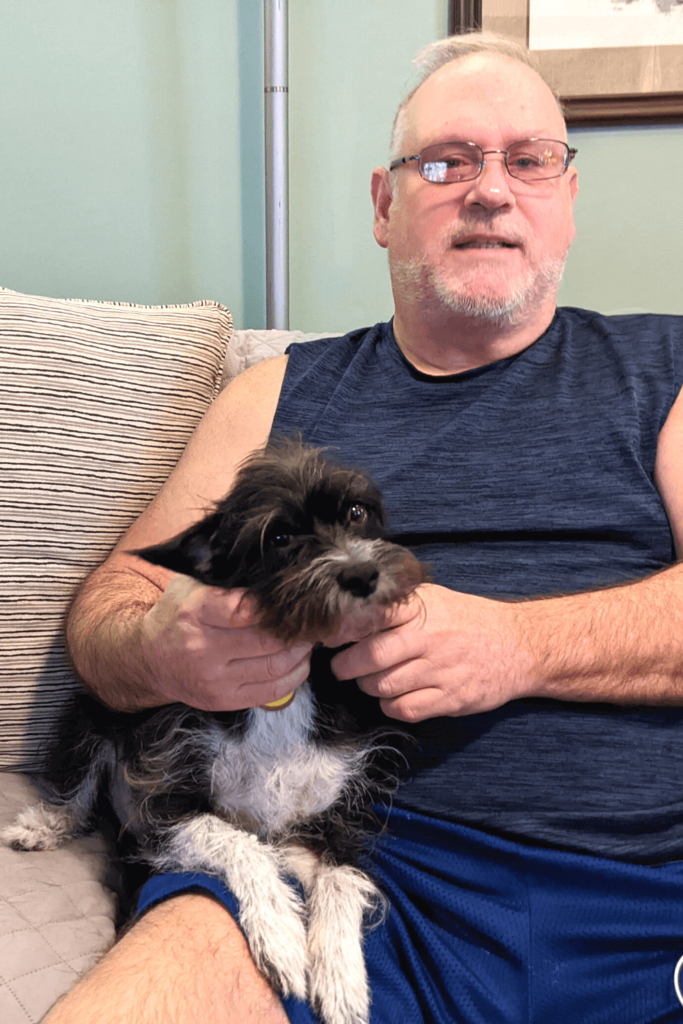
“I used Pets for Patriots because of the financial assistance,” he explains, “and using a program for vets.”
Many applicants tell us that while they could adopt a companion dog or cat on their own, they appreciate the sense of belonging Patriots for Patriots gives them.
Our own director of veteran outreach is a combat Marine veteran who served in Vietnam. He started his relationship with our organization like so many veterans who have since followed: by adopting a pet through our program.
Although James was eager for a companion pet he set aside several months for his search. It was important to the disabled Navy veteran to find a dog who was the right size and activity level, with an agreeable temperament, and who would not be afraid of his mobility device.
Nearly five months later the former sailor met his new first mate.
Lifeline
APA Adoption Center of Missouri is a beacon of hope for homeless animals in the St. Louis area. Since 2017 the organization has offered veterans in our program fee-waived adoptions when they save program eligible dogs and cats.
In late May a small dog with a fitting name – Scribble – was surrendered to the shelter by his family. While the circumstances are not known, it is always stressful for an animal to find himself suddenly unmoored from familiar surroundings and the people whom he loved.
Little could Scribble know that a disabled Navy veteran was looking for a dog just like him. The scruffy pup spent only a couple of days in the care of APA Adoption Center of Missouri before James came to his rescue.
Let’s roll
Scribble got a new moniker with his new life, like so many adopted pets.
The four year-old pup is now known as Oliver and has responded well to his new name. In general, he has taken nicely to James and his wife, though their adjustment is not without its challenges.
“He has adjusted well and is a lot of fun,” James shares. “The only issue is separation anxiety.”
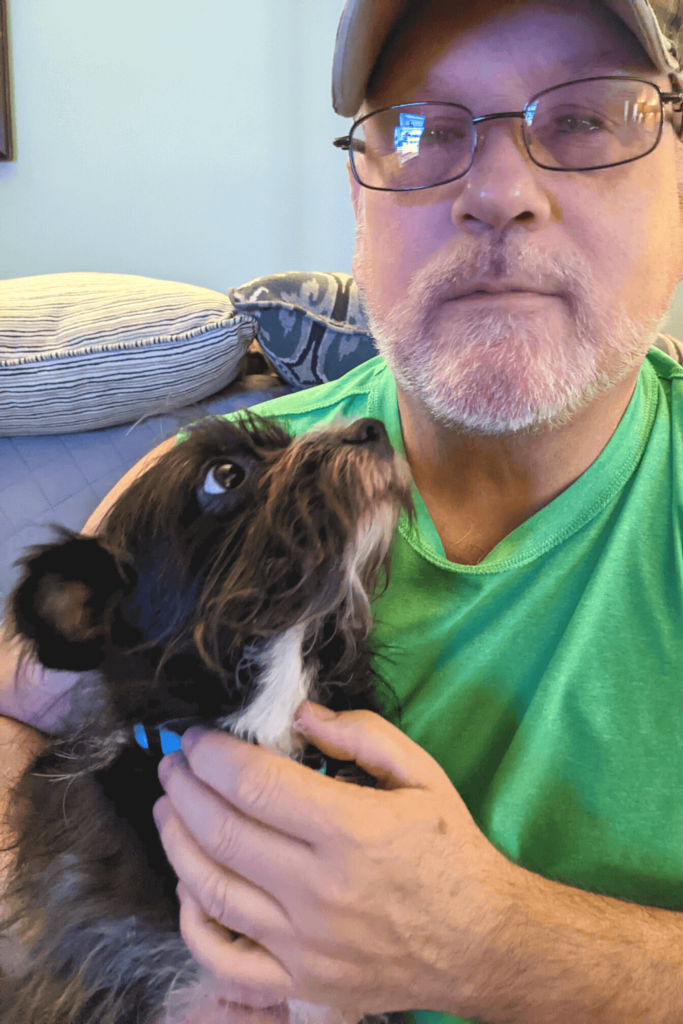
This condition is one in which dogs exhibit anxious behaviors when their guardian is absent. It can be expressed by excessive whining or barking, destructive tendencies, or house soiling. While some people think that is it cute when their dog shadows them everywhere, it can be a sign of an unhealthy bond.
However, patience and training can help minimize the impacts of separation anxiety on dogs and their human families.
Still, James is quite smitten with his newest mate.
Oliver “talks when he yawns,” loves to play, and has been a boon to the disabled Navy veteran’s emotion and physical health.
“Oliver has helped me by taking me for walks with a rollator,” James says, referring to his mobility assistance device. “I am more mobile since I brought Oliver home.”
All in the family
James may not have realized that when he and Oliver were adopted that they were joining another family as well. Pets for Patriots reaches out to every veteran in our program before and long after adoption. Our high-touch approach gives veterans we serve the sense of belonging that they need and want.
However, not all veterans in our program are seeking that connection – and that is okay, too. We try to meet each person’s needs for the type and frequency of contact preferred.
Sometimes the most basic benefits are the most meaningful. Making pet adoption more affordable. Moving the more vulnerable dogs – and cats – into loving military homes.
“I recommend[ed] veterans to use Pets for Patriots for the savings,” James says, “and finding deserving dogs homes.”
James has long understood the innate, therapeutic qualities of companion pets. And rather than allow his physical challenges to deny him that joy, they become a way to embrace it.
The disabled Navy veteran endures endless pain. He is mobility challenged and spends most of his time at home, and could have dealt with these challenges in harmful ways. Instead, he chose to uplift his own fortunes and those of a lively and loving shelter dog.


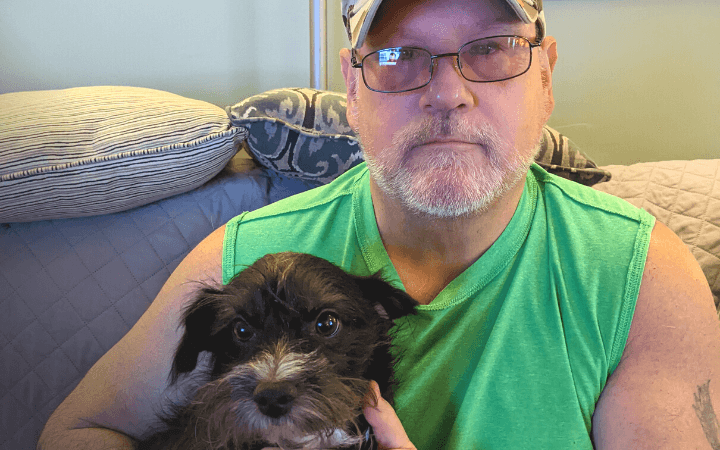


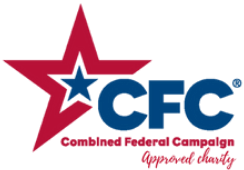





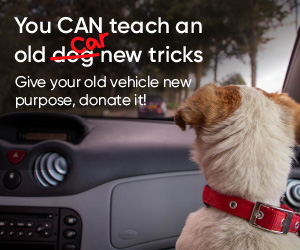
Thank you for your service, sharing your story, providing Mr. Oliver with a home, love, care, and a job which I believe all dogs need!!
Thank you for your service! It warms my heart to know you have given Oliver a wonderful new home May you share many joyful years together!
Thank you for finding a good home for Oliver.